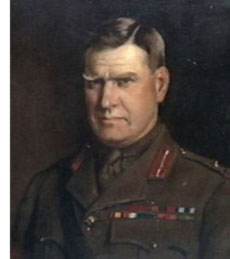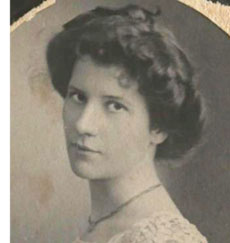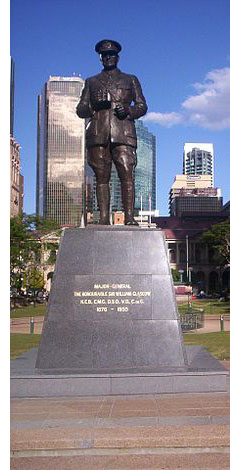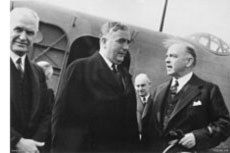
 |
|
Places Industries Families Stories
 |
Major General The Honourable Sir Thomas William Glasgow, K.C.B., C.M.G., D.S.O., V.D., C de G. 1876-1955 Born a local lad in Tiaro at ‘Upton Bank’ on the Mary River, 6th June 1876, Sir Thomas William Glasgow was the 4th child of 8 sons and 3 daughters of Samuel Glasgow, a farmer from northern Ireland and his wife, Mary Margaret Trotter Anderson, an Englishwoman of Scottish decent. Will was educated at the One Mile School at Gympie, then at the Maryborough Grammar School. In 1893 he started work as a clerk – firstly for a mining company in Gympie and later a senior clerk at the Queensland National Bank. In his teens Bill joined the Wide Bay Regiment, Queensland Mounted Infantry, giving up most of his weekends to soldiering. In 1897, with 19 other volunteers, he represented Queensland at the Diamond jubilee of Queen Victoria in London.
Right: He sent hundreds of letters to ‘Bella’.
In March 1916 when the 4th and 5th divisions were formed Glasgow was promoted temporary brigadier and given the task of raising and commanding the 13th Infantry Brigade. He led his men in many important actions including those at Pozieres, Messines, Passchendaele, Mouquet Farm and Derancourt. He was appointed C.M.G. in June 1916 and C.B. in December 1917. Sir Glasgow was awarded many medals during his campaigns.
C. E. W. Bean described him as ‘the most forcible of the three strong brigadiers of the 4th Division. With keen blue eyes looking from under puckered humorous brows as shaggy as a deer-hound’s; with the bushman’s difficulty of verbal expression but sure sense of character and situations; with a fiery temper, but cool understanding and a firm control of men; with an entire absence of vanity, but translucent honesty and a standard of rectitude which gave confidence both to superiors and subordinates, he could-by a frown, a shrewd shake of the head, or a twinkle in [the eye] ... awaken in others more energy than would have been evoked by any amount of exhortation. “A typical Australian, clean shaven, with beetling eyebrows, a born horseman, this quiet Queensland squatter has reaped in France the harvest of years of quiet study of tactics and strategy, which has ever been his chief interest in life. Though little known in Tasmania, he is probably the most outstanding character in the AIF.” “ ... he soon distinguished himself on Gallipoli by reckless personal bravery and ability to command … he penetrated with a small party into the Turkish trenches against overwhelming odds escaping death by what seemed a miracle.”(Sir) Robert Menzies later described Glasgow as the complete personal embodiment of the A.I.F.’. He enjoyed a drink and a joke but was a man of simple tastes. Throughout his life he visited his sisters in the house above the Mary River in Gympie, and always regarded the area as his home. Sir Thomas William Glasgow passed away on the 4th July 1955 in Brisbane.
|
|||
 Sir Thomas William Glasgow, K.C.B. , C.M.G., D.S.O., V.D., C de G. 1876-1955 was a senior Australian Army officer and politician. Glasgow rose to prominence during the First World War as a brigadier, and later divisional commander on the Western Front. Post-war, he was elected to the Australian Senate, representing Queensland as a Nationalist Party member from 1919 to 1931, before appointment as Australian High Commissioner to Canada.
Sir Thomas William Glasgow, K.C.B. , C.M.G., D.S.O., V.D., C de G. 1876-1955 was a senior Australian Army officer and politician. Glasgow rose to prominence during the First World War as a brigadier, and later divisional commander on the Western Front. Post-war, he was elected to the Australian Senate, representing Queensland as a Nationalist Party member from 1919 to 1931, before appointment as Australian High Commissioner to Canada. Back in Australia, Glasgow formed a partnership TW & A Glasgow with his younger brother Alexander and took over his father’s Gympie grocery store.
Back in Australia, Glasgow formed a partnership TW & A Glasgow with his younger brother Alexander and took over his father’s Gympie grocery store.  WWI. Having relinquished store-keeping, Glasgow had just bought a cattle station in central Queensland when World War I broke out, however, he enlisted immediately in the AIF. Three of his six brothers also enlisted and he embarked for Egypt on the 24th Sept 1914. He landed at Gallipoli major and on to Gallipoli on May 1915. He succeeded Lieutenant Colonel Rowell as acting commandant of Pops Hill 200 and from there on the 7th August he led the 200 New South Wales men of the Light Horse in an attack on Dead Man’s Ridge, all but 46 were killed or wounded Glasgow was one of the last; left carrying one of his wounded solders.
WWI. Having relinquished store-keeping, Glasgow had just bought a cattle station in central Queensland when World War I broke out, however, he enlisted immediately in the AIF. Three of his six brothers also enlisted and he embarked for Egypt on the 24th Sept 1914. He landed at Gallipoli major and on to Gallipoli on May 1915. He succeeded Lieutenant Colonel Rowell as acting commandant of Pops Hill 200 and from there on the 7th August he led the 200 New South Wales men of the Light Horse in an attack on Dead Man’s Ridge, all but 46 were killed or wounded Glasgow was one of the last; left carrying one of his wounded solders.  For 20 years he led the Anzac Day Parade in Brisbane, became the deputy leader of the opposition in the Senate, the First Australian High Commissioner to Canada and director to many companies.
For 20 years he led the Anzac Day Parade in Brisbane, became the deputy leader of the opposition in the Senate, the First Australian High Commissioner to Canada and director to many companies.